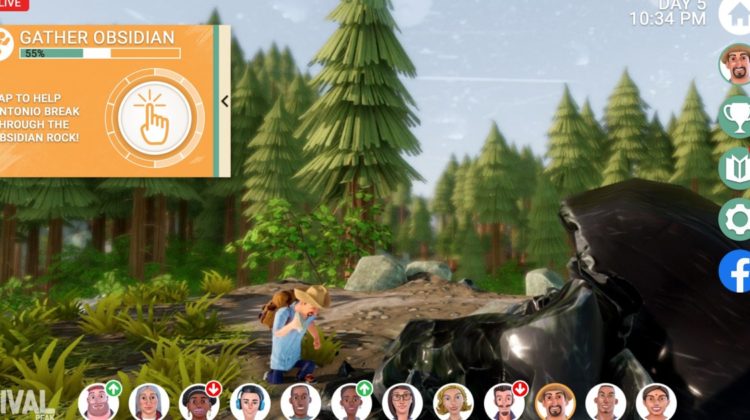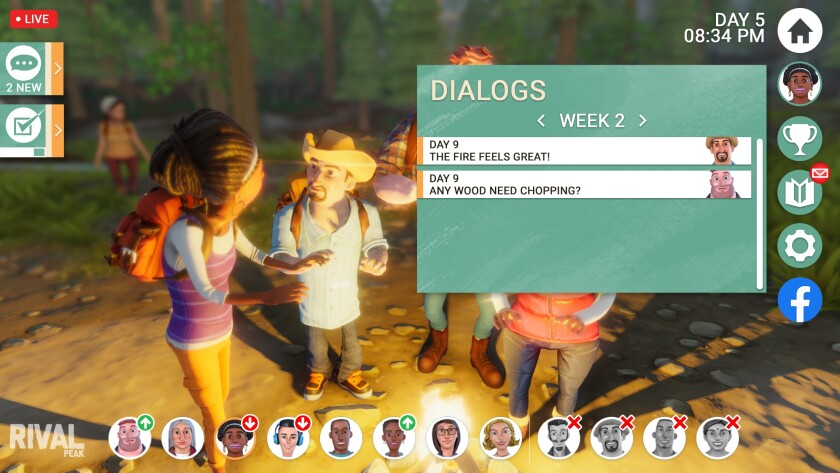
Part video game, part reality show and part animated series, a new project airing on Facebook wants to shift the thinking on interactive television. “Rival Peak,” which will run daily for 12 weeks, allows for different levels of user engagement, unfolding as a scripted series that will shift based upon audience input.
At first glance, “Rival Peak,” which started Wednesday, might remind you of “The Sims.” Only here we’re not controlling characters so much as prodding them along. It also deviates from the Choose Your Own Adventure-inspired feel of many live-action attempts to meld games and television, including a number of relatively high-profiles examples from streamer Netflix.
Rather than emphasize big life-or-death choices, “Rival Peak” seeks participation in a more continuous, playful manner, hoping to forge emotional connections between viewers and players by encouraging the artificially intelligent characters to, say, read a book or pitch a tent. If it works, it will be a seamless merging of games and television by pulling on the strength of the former — that is, regular feedback and communal involvement, rather than asking how a TV show can be more game-like.
It’s an “experiment,” says Facebook’s vice president of content planning and strategy, Matthew Henick, noting whether it feels more show-like or more game-inspired will depend on how actively audiences lean in.
“There will be familiar presentation styles to reality shows, whether ‘Survivor’ or ‘Big Brother,’ with gaming elements alongside it,” Henick says. “They’ll opt in to the gaming part. On the top level, this is an interactive reality show that uses elements of gaming and is using a game engine.”
Of course, part of the appeal of a reality show is seeing real people make bad choices. In “Rival Peak,” the participants are brightly drawn animated characters, all of whom boast a cartoonish, claymation-inspired look. There’s an underlying narrative and a “Lost”-like mystery that will gradually reveal itself, but to succeed audiences will need to forge a connection with these characters in the same way we become attached to those in an animated film.
That’s where the gaming element comes in. The hook will be gently nudging characters along and seeing how (or if) our choices compare to the other viewers.
“People want their choices to matter,” says Stephan Bugaj, chief creative officer of dj2 Entertainment, the company that coproduced the “Sonic the Hedgehog” film and is working to bring a number of game properties to film and television. Bugaj, a veteran of the defunct studio Telltale Games, which worked on popular narrative games such as “The Walking Dead,” helped oversee the “Rival Peak” story line.
“Big variations — big swings — often go unnoticed or unappreciated,” Bugaj says when asked about a lesson from working at Telltale.
Thus, in “Rival Peak,” we’ll tap and click, depending on the screen we’re using, to influence character actions and dialogue and then sit back and watch it unfold. The show will run live for eight hours each day, but it’s meant to exist in the background — expect relaxing music — with viewers popping in and out to see what the characters are up to and what choices the community made. Actor Wil Wheaton will host a wrap-up show each week to hit major story points.

A look into “Rival Peak,” a new game-meets-show that will air on Facebook.
(Facebook Originals)
“What people really want is to care about character and influence the character journey,” says Bugaj. “The big plot moves are scripted, but how they play out is influenced by user input. The most directly noticeable outcomes that users will be changing is who gets eliminated each week. But that requires us to then pivot the story to account for those changes.”
The more I dove into “Rival Peak,” the more it reminded me of one of the first computer games I fell in love with, the mid-’80s Activision title “Little Computer People.” I was transfixed as a 5-year-old at the relaxed lifestyle of the tiny digital sprites that lived in our basement desktop. Most of the time they went about their business without me interacting, allowing me to play the role of a godlike voyeur as I gently toyed with their domesticated, virtual lives.
“Rival Peak” exists on that continuum, from “Little Computer People” to virtual Tamagotchi pets. Only it has a Pacific Northwest setting with an underlying narrative that pulls inspiration from “Survivor.” The 12 in-game characters will be presented with challenges and resources to find while exploring the wilderness.
The project will certainly lean into its medium, even presenting elements that may appear like glitches in the game, only to reveal that the in-game characters are then talking about what appeared as an error. Such mysteries are, of course, fuel to get the audience talking, debating and concocting various character dramas.
“Even if they’re not live action characters, even if they’re not doing a lot of deep stuff, they just become a part of your world,” says Bugaj. “It’s the Tamagotchi effect. Like, what did a cat Tamagotchi do? Nothing. But people cried when their Tamagotchi died. So there’s just the ability to spend a lot time with, and be comfortable with, the character. That’s a big boost that I don’t think a lot of people look at. This is persistent and has the potential to be a part of your life in a way that doesn’t require a lot of your attention, like a Tamagotchi or a fish bowl.”
If “Rival Peak” finds an audience, the hope is that it will not only show the power of live, cloud-streamed games but further meld linear, TV-inspired storytelling and interactivity. It’s an area filled with experiments, ranging from Netflix’s “Black Mirror” episode “Bandersnatch” to games such as “Quantum Break,” which tried to alternate between gameplay and a live-action show.
“If this experiment works, it will start to crack open the door for a new type of storytelling,” says Facebook’s Henick. “It’s one that is social amongst the people watching, one that’s interactive between you and creatives itself. I hope there’s more of these. I hope we can allow users to create their own. I think the key is that people are the center. People drive the story rather than just passively receiving it.”
